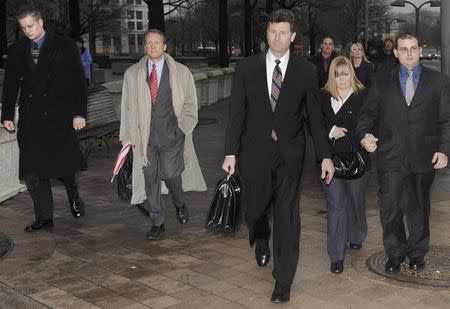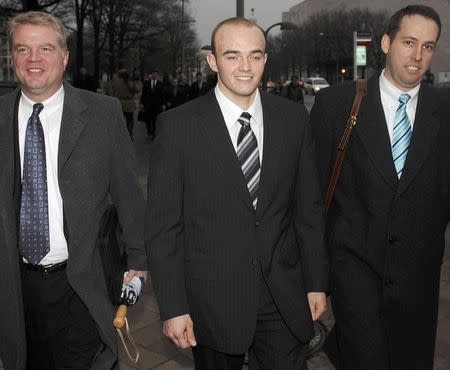U.S., Blackwater defense clash on jury summary of shooting
By Aruna Viswanatha WASHINGTON (Reuters) - A U.S. prosecutor and a lawyer for a former Blackwater Worldwide security guard on Wednesday presented a jury with starkly different summaries of a 2007 shooting at a Baghdad traffic circle that sparked international outrage and charges of murder or manslaughter for four guards. The guards "took something that didn't belong to them, the lives of 14 human beings," prosecutor Anthony Asuncion told the jury. He spoke of victims shot in the back as they tried to flee, and recounted the testimony of relatives who gave emotional accounts of their loved ones' gory deaths. There were "no insurgents, no AK-47s, just people seeking shelter from these men," Asuncion said, pointing to the defendants who sat in the courtroom. Later, a lawyer for Paul Slough, one of the guards, told the same jury that he "didn't recognize" the prosecutor's summary of the trial, saying that "witness after witness" had testified about incoming gunfire and pervasive threats to the Blackwater convoy. One focus of dispute concerns a white Kia driven by a medical student traveling with his mother. The guards contended that the vehicle appeared to be a potential car bomb approaching the convoy. But prosecutors said one of the guards fired into the car, unprovoked, killing the driver and igniting a barrage of gunfire. Slough's lawyer, Brian Heberlig, said the Kia had pulled out of traffic and was moving toward the convoy when his client followed protocol by firing the first warning shot at the car's engine block. The prosecutor had described the scene differently. Asuncion said a different guard, Nicholas Slatten, fired the first shots. He said Slatten watched the car carefully and pulled his trigger twice, killing the driver of the Kia. Slatten is charged with murdering the driver. Slough, along with Dustin Heard and Evan Liberty, had been charged with manslaughter over the other 13 deaths; attempt to commit manslaughter of others who were wounded; and a firearms offense carrying a mandatory 30-year sentence. The September 2007 shootings at Nisur Square, four years into the Iraq war, sparked international outrage. The guards were trying to secure a path for a State Department convoy. The jury, expected to begin deliberations early next week, has heard for more than two months from witnesses including relatives of those killed. It also heard from other members of the Blackwater convoy, Raven 23, who provided a mixed picture of whether the unit faced threats when its members fired. On Wednesday Slough's lawyer urged the jury to focus on evidence that appeared to show AK-47s had been fired at the Blackwater convoy from positions south of the circle. He said this forced the guards to engage in a firefight. Lawyers for the defendants had only called four witnesses at trial, relying mainly on trying to poke holes in testimony of witnesses the government had called. In his summation, Asuncion walked the jury through some of the testimony, showing photos of each witness and emotionally recounting their words. His voice cracking, Asuncion reminded jurors of the father of nine-year-old Ali Razzaq, who spoke of getting out of his car to have "his son's brains fall out at his feet." He also recounted how another Raven 23 member, Marc Mealy, testified that Slatten spoke of Iraqis as "animals" and had boasted of shooting a man whose head he "turned ... into a canoe." The trial has unfolded as Islamic State militants have captured one-third of Iraq, drawing the first American air strikes there since the end of the occupation in 2011. Last week prosecutors dismissed charges Heard and Liberty faced over five of the deaths. (Reporting by Aruna Viswanatha; editing by Caren Bohan and David Gregorio)


